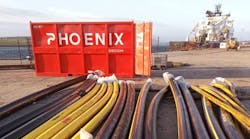Henri Phillipe Reichstul was picked from outside company ranks earlier this year to become the president of Brazil's national oil company, Petrobras. Reichstul will lead Petrobras through a transition period from a state company operating largely in a monopoly environment, to a company that will have to compete with an array of new producers in formerly exclusive home grounds. The following is an interview with Reichstul, conducted by George Hawrylyshyn, a contribut ing editor for Offshore in Latin America and editor of Brazil Energy.
Offshore: How do Petrobras' present oil reserve levels compare with the inter national major oil companies?
Reichstul: Petrobras has double the average reserves of the major oil companies - something like 20 times our annual production. But exploration is fundamental for us. The value of an oil company is in its reserves, and because of that, it must continuously search for more oil and gas.
Offshore: What changes are taking place within Petrobras as a result of changes in the petro leum law?
Reichstul: When Petrobras had a monopoly, its goals were very clear. More than goals, the company was responsible for supplying the entire nation's oil products. This has changed. With flexibilization of the petroleum law, Petrobras has to act as a an enterprise. To do this, we really need results, in order to grow and finance our investments.
Offshore: Does the Brazilian government have a mandate for Petrobras?
Reichstul: The government strategy is to transform Petrobras into a corporation. Obviously, we are interested in increasing revenues. If we don't, we will not earn the money we need. I want profits, but I also think about the growth of the company.
Offshore: What are your strategic plans?
Reichstul: We are now defining the strategy of how to be more competitive and elaborating a strategic plan. We are bringing in outside consultants and we are analyzing what is happening around the world and in Latin America, in terms of the energy, oil, and gas business. And we're also analyzing the Brazilian market, as a result of the possibility of importing oil products beginning next year. I'm still not certain how we are going to act as a company.
Offshore: How unique is this situation in Brazil?
Reichstul: Petrobras is in a comfortable position, with 99% of the refining and 34% of the distribution market in the country. We are in a unique historical situation and we need to set up a strategy for the company that allows it to continue to earn money and generate resources.
Offshore: What about Braspetro (Petrobras' inter national subsidiary)?
Reichstul: Braspetro is typical of what we are talking about. Braspetro should grow a great deal because it is a company with a large technical and physical support base behind it. Our intention is that it should operate mainly in deepwater, because of Petrobras' technology. Also, we are seeking to expand our presence on the west coast of Africa.
Offshore: How do you expect to finance exploration and production operations in the future?
Reichstul: We have the technology for exploration. Our fragility is financial - we are a Brazilian company. We have to compensate for this fragility with technology. In exploration, our financial costs are lower. At the same time, however, we also are interested in financing production. If project financing can be developed, we can combine one with the other.
Offshore: Have the external changes altered your business focus?
Reichstul: We have two types of oil and gas businesses - upstream and downstream. The company is more profitable in the production sector (upstream). We would be able to make a profit of US$6-7/bbl, if oil were to stay at $20/bbl. In refining, how much is the margin? Maybe $2/bbl. On average, the cost of a bbl of oil is $12.50-13.00. Whatever is left over is profit. Obviously, the margin varies depending upon the well. In a giant field, where productivity is higher, we can earn up to $6-7/bbl.
Offshore: What are your production goals for Petrobras?
Reichstul: Our production goals are being revised at the moment. We will not hit the goal of 1.2 million b/d of oil this year. This is because of a delay in the construction of platforms, other equipment problems, and problems in equipment availability, both within Petrobras and from abroad. The changes in the economic situation also have affected us. Average prroduction for this year will be 1.134 million b/d, the same number we reviewed in January. For the year 2000, we are maintaining an estimate of 1.3 million b/d.
Offshore: What is your view of your new partnerships and the 3-year periods?
Reichstul: The question of the Petrobras joint-venture partnerships is of the greatest importance, both for the nation as well as for Petrobras. Our government has worked to try to get the oil market to understand that during a two or three-year process, Petrobras had offered partnership opportunities in the blocks ANP (Brazil's National Petroleum Agency) had conceded to it (36 blocks), out of a total of 115 original concessions.
Consequently, we asked for and received an extension of the time periods for exploration in these areas. The extension was from three years to five years, in 34 of the areas, and from three years to nine years, in two others in the mouth of the Amazon River - where work is difficult due to high tides and strong currents.
The review of the partnership contracts is being done now and the text of the contract addendums are being prepared. We expect that as a result of these changes, the oil companies will be preparing themselves to sign the partnership contracts. Thus, it is our expectation that very soon we will be signing contracts with the majors.
Offshore: What are your views on Repsol's offer to buy YPF (former national oil company of Argentina)?
Reichstul: For those of us who work in the Latin American oil industry, the move by Spain's Repsol to buy Argentina's YPF has significantly increased the value of both companies. It is very encouraging for Petrobras and other companies in Latin America.
There are two events that have recently valorized Latin American energy: the privatization of Comgas and the purchase-offer of YPF by Repsol. There is also the possibility that YPF will sell off its Argentine assets, which might reduce our Argentine downstream area, and could affect Petrobras' plans. This represents a challenge for Petrobras, since Repsol/YPF could become either a partner or a competitor. In either case, it is a stimulating idea.




